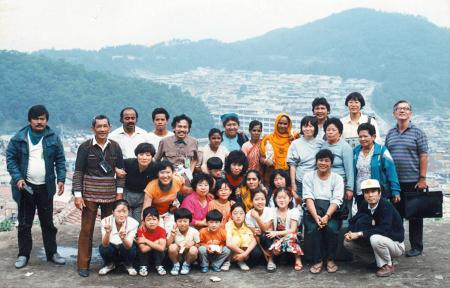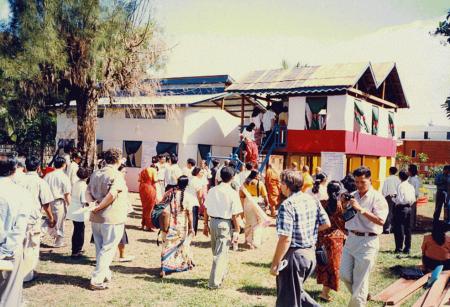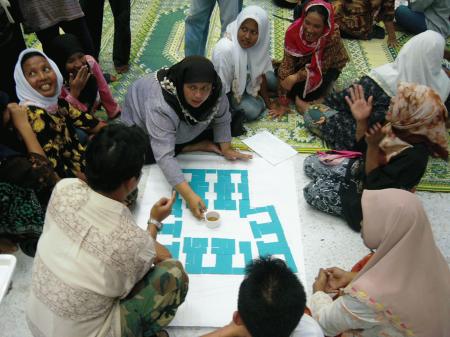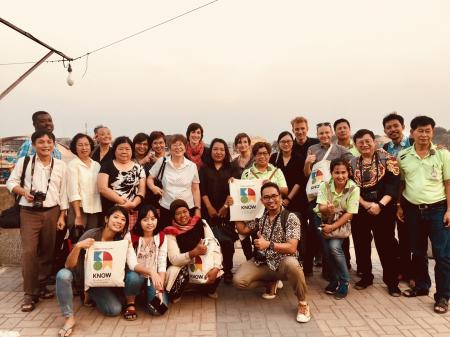- TOP
- 資料館
- FOCUS
- December 2019 - Volume 98
- ACHR and Housing Rights in Asia
FOCUS December 2019 Volume 98
ACHR and Housing Rights in Asia
Of the 2.3 billion people now living in Asia's towns and cities, almost a quarter still reside in slums. Despite the undeniable increase in average incomes and consumption and the fast transformation of Asian cityscapes, supplying enough affordable, accessible and decent housing remains one of the biggest challenges of the region. The local, national and transnational real estate markets have been a key driver of overall economic growth but have also fostered speculation around land and housing, produced oversupply in high-end segments and shortage in the most deprived sectors, deepening the already critical socio-spatial inequalities of the region.
In parallel, the systematic retreat of the state from direct housing provision has resulted in feeble budgets and subsidies, and the deregulation of land and housing markets fitting the needs and interests of private sector developers. National housing authorities that were originally set up with a mandate to house the poor, focus now on those “market segments” that can afford formal credits and mass-produced housing products, defeating the purpose of the public resources invested. The human right to housing has become a commodity unaffordable for the poor and most vulnerable inhabitants.
Due to the lack of any legal, accessible and affordable housing, millions of ordinary, hard-working urban families continue to make their own shelter as best they can on dangerous, leftover land, without access to clean water supply, electricity, sanitation, drainage or other urban amenities. Most of the resulting informal settlements will eventually face eviction, whether it is by demolition squads, or by the powerful market forces that determine how urban land is used. Half a billion people will eventually be pushed out, likely with no compensation and no alternative housing.
The Asian Coalition for Housing Rights
Issues of eviction, access to land, environmental risk, shelter quality and affordability have been at the core of the work of the Asian Coalition for Housing Rights (ACHR) from its beginnings in 1988. In the past thirty-one years, more than one hundred groups in nineteen countries in Asia have been active in the coalition, accumulating a wide range of experiences, knowledge, lessons learned, and achievements. From fighting evictions to developing a regional model of community-driven, city-wide slum upgrading, ACHR’s work aims at realizing the right to adequate housing using Asia’s greatest resource: its people.
Founding members of ACHR at the Asian People's Dialogue, Seoul, Korea, June 1989
Fighting evictions
ACHR first came together as a regional coalition of people and groups in Seoul at a time when huge evictions were taking place as the city prepared to host the 1988 Winter Olympics. ACHR's activities in this period included organizing fact-finding missions, anti-eviction campaigns, eviction monitoring, advocacy, meetings to link activists and urban poor groups, organizing poor community groups and advising them about the laws which relate to their housing rights. All the groups that came together for the first time in this new coalition were deeply concerned by the evictions taking place around Asia, and by the huge numbers of poor people being excluded from their cities.
Exploring solutions to eviction before they actually take place
During evictions, communities have few options but to resist and confront. By then, it is too late to explore alternative options or to facilitate a more reasoned dialogue. As activists, we quickly began to see that no matter how much we denounced and fought evictions; we never won the larger war. For every single eviction case we helped to stop or slow down, there were a thousand other slums and squatter settlements whose date with the demolition squad was coming, a thousand other city development plans and government slum clearance policies being drafted that would cause new waves of evictions and housing rights confrontations.
In this stage of ACHR's work, we began to look at a variety of ways in which housing rights conflicts could be addressed before any eviction took place. As the groups in the coalition faced evictions, they also found proactive ways to deal with them. The numerous experiences in slum upgrading, accessing housing finance, collaborating with other stakeholders, collecting information about informal settlements, developing community networks and starting community savings and credit, among others, created a common pool of alternative solutions, which could be borrowed and transferred. This stage of the ACHR's work strengthened and multiplied the links between ACHR members, and furthered the sharing of knowledge, mutual assistance and joint advocacy among all the groups. This approach materialized in the Training and Advisory Program (TAP)1 and became one of the coalition's key tools for facilitating mutual learning and support.
The Model House Exhibition, Phnom Penh, Cambodia, May 1997
Showing how poor communities themselves can deliver solutions
Year after year, communities kept hearing the same excuses from governments: there is no available land for housing or resources for subsidies or loans to the poor. Due to lack of imagination or blatant economic interest, in their aspiration to become the local Singapore, most governments in Asia saw only the alternative of building new tall blocks of flats for everyone. However, those formal systems of housing delivery have been unable to keep up with the demand for secure, affordable and accessible housing.
At the same time, the poor communities on their own manage to find land, make some kind of shelter, earn enough to survive and bring up their families - even though all that miraculous survival often takes place in inhuman conditions. For most groups in the ACHR coalition, this is the most interesting aspect of our work – the tremendous creativity, energy and capacity to survive among the urban poor is an enormous development force which can be channeled into solving housing problems at the real scale.
In this third stage of ACHR's work, we decided to develop the regional support systems that poor communities required to deliver their own solutions and propose them to their governments and broader societies. Many activities had to do with building the capacity to develop such solutions collaboratively, including community savings and credit (as a tool to develop people's own funds and their abilities to manage finance collectively), building networks which link poor communities within cities and within countries (to strengthen their mutual learning and collective bargaining power) and supporting some of the first community-driven housing and settlement upgrading activities. A number of ground-breaking housing and community upgrading projects were implemented by poor communities in different countries, and these projects began to show new kinds of people's solutions. The increasing linkages between groups and countries, which ACHR continued to facilitate, made the learning from these scattered projects zoom around the region quickly and powerfully.
Slum upgrading: from scattered pilot projects to city-wide and community-driven development
Those scattered people-driven pilot projects started to scale up through the regional promotion and support of a citywide and people-driven slum upgrading movement in Asia. Under this approach — which we refer to as the people’s process — organized networks of poor communities at the city scale survey all the settlements in the city, manage their savings and revolving city funds, develop plans for upgrading all the settlements, negotiate for land and infrastructure, develop their layout planning and design their affordable housing types at citywide scale. Since 2008, with support from ACHR's ACCA Program (Asian Coalition for Community Action),2 this approach reached groups in two hundred fifteen cities in nineteen countries. In only five years, the local groups and networks developed their own citywide and people-driven upgrading process, in collaboration with their local governments. 2,021 communities implemented small upgrading projects and one hundred forty-six housing projects for about 10,280 families were built by those same communities.
Chawanad Luansang, a young Thai community architect, facilitating a community housing layout design workshop at the Poo Poh Community in Pattani, Thailand, March 2007. Note the coffee cup that represents the planned mosque of the community.
Reflecting on scale: from communities’ action to structural change
After the impressive growth of our coalition during the ACCA program (finalized in 2014), a time for reflection has been necessary. As a network, we continue to support the strengthening of local community networks and partnerships and keep our regional learning and mutual inspiration active. We have also undertaken a significant amount of research and documentation initiatives, aiming at valuing and disseminating the existing knowledge of communities and groups in our network on critical issues for their own development such as the definition and measurement of poverty lines and food security, the status and impact of community finance systems in five countries and innovations on housing policies.3 We have also joined global initiatives seeking to find pathways to urban equality4 and promoting collective housing5 around the world.
Realizing Housing Rights through City-wide, Community-led Development
ACHR’s learnings from the last three decades of direct work with poor communities contribute optimistically to realizing the right to housing for all in Asia. While the formal recognition of a right is a useful legal tool, it does not necessarily translate into its full realization, nor does it challenge the structural conditions of power disbalance and poverty. ACHR’s approach has proven its potential to successfully realize the right to housing at the scale of the need, due to some essential characteristics of its modus operandi:
a. It is based on a proactive, pragmatic relationship with state actors
In a context of shrinking civil society space, community-led development is a highly pragmatic, solutions-oriented approach that recognizes the need for negotiation and fair partnerships with all stakeholders in the city, particularly the local governments. The community process builds a strong sense of self-reliance but recognizes that state actors still remain the key-holders to legality, access to secure land tenure and finance.
b. It is cost-effective and socially appropriate
Community-led design, construction and management of housing projects and finance systems ensure the affordability and adequacy of the product of the housing process.
c. It breaks the isolation
Because of the links between communities, cities and countries which ACHR has built and continues to build, all the groups in the region are part of a movement, work with full support and full access to a region-wide pool of community experts and support professionals, and part of an international network that provides inspiration and a powerful political leverage that proves what people can do by themselves.
d. It is truly empowering and builds democracy from below.
When poor communities work together as networks, understand, discuss and prioritize their problems, develop plans and bring solutions and resources to the negotiation table, they are taking ownership of an issue which has been taken up by others (governments, development organizations, human rights groups or activists) on their behalf. The very people whose housing rights are at stake become the solution-makers. They create a profound shift in social perception and political power, from being passive receptors or constituencies, to active agents of their development. In the process of housing development, communities exercise their citizenship.
The ACHR/KNOW research-action team, Nakhon Sawan, Thailand,
January 2019
Challenges and Future Work
The ongoing people’s processes in different cities of the region have lived through periods of great accomplishments, as well of moments of stagnation and even regression. Data collection and the strengthening of city-level community and savings network continue to be key activities in building and renovating the political capital and legitimacy of the communities’ work. In some cities, the community networks and their local support groups have reached a stage in which they are involved in local and national policymaking and contributing to the design and implementation of housing and poverty reduction programs (Thailand and the Philippines), or in big-scale financial mechanisms for the poor (Sri Lanka) or innovative collective micro-loans schemes (Myanmar). The renovated links of ACHR with global movements are also not casual: the forces behind the local and national housing crises are global, and so the need for the efforts of social movements fighting through different means for the realization of the right to housing.
Soomsook Boonyabancha is a Thai architect and planner who worked with Thailand’s National Housing Authority (NHA) from 1977 to 1989, with the Urban Community Development Office (UCDO) from 1992 to 2000 and with the Community Organizations Development Institute (CODI) where she was Director for two terms (eight years). She is currently advisor to CODI and the Secretary-General of ACHR.
Thomas Kerr is an American architect who has worked in Asia since 1989, first in India and from 1996 in Bangkok with ACHR, where he helps coordinate their English-language publications. This “conversation” would have not been possible without Tom’s admirable documentation discipline and his valuable inputs throughout the conceptualization and writing of this article.
Brenda Perez-Castro is a Colombian sociologist, urbanist and development practitioner who has worked for non-governmental organizations and international cooperation agencies on housing and slum upgrading in Latin America and Asia. She is currently supporting research initiatives at the ACHR Secretariat in Bangkok.
For more information, please contact: Asian Coalition for Housing Rights, 73 Soi Sonthiwattana 4, Ladprao 110, Bangkok 10310, Thailand; ph 662 538 0919; fax 662 539 9950; e-mail: achr@achr.net; www.achr.net.
Endnotes
1 For more information on TAP, please visit www.achr.net/upload/downloads/file_10112019122402.pdf.
2 For more information on ACCA, please visit www.achr.net/activities-de.php?id=1.
3 For academic articles on these subjects, visit www.achr.net/download.php?ic=1.
4 See www.urban-know.com for our ongoing research-action on the links between community-led development and urban equality.
5 For more information on the Co-Habitat Network visit www.urbamonde.org/en/projects/cohabitat-network and read our first report on “why do we need collective housing in Asia” http://achr.net/upload/downloads/file_12122019141022.pdf.




